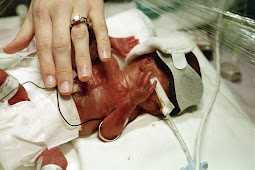Disability and Dads — Where Desperation Meets Delight

I can think of no more desperate scenario than the one that plays out with your child suffering and you as the parent being helpless to come to their rescue.
Such is the beautiful, grace-disguised, heart-crushing struggle of parenting a disabled child.
I’m speaking especially to fathers here — fathers who fix things. You can’t fix this. Fathers who defend their children — you can’t defend against this. You can’t fight this. It’s like punching the wind.
So how do we, as fathers, lead our families and fight for faith on such a desperate battlefield as disability?
Desperate times call for desperate measures.
From the Mountain to Humility
In Mark 9 Jesus and his inner circle of disciples are coming down from the Mount of Transfiguration (see verse 9). Some of the disciples got to climb to the mountaintop with Jesus and some had to stay down in the valley. Apparently the disciples that stayed down below were healing some people in Jesus’ name.
Everything was going fine until a certain father with a severely disabled son shows up and requests that his son be healed.
“No problem. We’ve got this. Stand back and be amazed.”
Apparently the disciples lay their hands on the boy, like they had done so many times before.
And nothing happens.
They say all the words they have said before.
And nothing happens.
They go through all the healing motions they have gone through before.
And nothing works.
Jesus on the Scene
The religious leaders are watching, putting the pressure on the disciples — wagging their heads and inciting the crowd. The disciples are sweating, the scribes are mocking, and the father doubts anything of this is real. Everything is going south. And then, just as if on sovereign cue — Jesus shows up!
And when they came to the disciples, they saw a great crowd around them, and scribes arguing with them. And immediately all the crowd, when they saw (Jesus), were greatly amazed and ran up to him and greeted him. (Mark 9:14–15)
The disciples needed healing power — so they ran to Jesus. The religious leaders wanted healing proof — so they ran to Jesus. The father needed a healing promise — so he ran to Jesus. They all ran to Jesus! There is a great sense of desperate urgency in their simple action.
This is not theological rocket science. If you are a church leader, pastor, teacher, professor or elder, the most theologically correct thing you can do is run to Jesus. Lead your people to Jesus. Don’t make it difficult, just run as desperately as you can and say, “Follow me!”
If you are a parent, a caregiver, a sibling, a spouse, or a family member walking through the valley of disability, the most practical thing you can do is to run to Jesus.
Fathers, don’t walk — run!
A Dad’s Voice
But there is more to this account.
And he asked them, "What are you arguing about with them?" And someone from the crowd answered him, "Teacher, I brought my son to you.” (Mark 9:16–17)
From the entire crowd of healers and religious experts, one voice stands out. It was not the voice of theological education; it was the voice of total desperation. It was not a voice from a disciple — but from a dad. Not even from a follower — but from a desperate father.
Fathers, your voice is important in the life of your disabled child. Don’t be on the sidelines while your wife carries the load. Run to Jesus. Sprint to Jesus. Lead your family to Jesus. Cry out to Jesus on behalf of your son or your daughter.
Your voice is important. Your prayers are invaluable.
A Desperately Dependent Dad
That one statement, “I brought my son to you” glorified Jesus more that day than all the healing powers of the disciples and all the theological intelligence of the scribes.
Why? Because, that one statement revealed an absolute desperate dependence on the grace of God in the power of Jesus. Again dads, it’s not theological rocket science. Run to Jesus. Bring your child, your family and your desperation.
I think it is wonderfully poetic that Luke adds the phrase from the father, “He is my only son,” revealing a hopeful glimpse of the gospel light from the dark valley of disability.
It could be said that this despairing dad is taking his only son, to the only son. And he is pleading before God — the same God who will give his only son so that this man and his only son might be saved, not just temporarily from disability, but eternally from sin (Romans 8:32).
Fathers, you must do all you can do for your disabled child. And all you can do is run to the source of hope, healing, and help. All you can do is cry out on behalf of your child, your family and your own fragile faith. All you can do is bring your child to the cross and ask the Father of mercy and the God of all comfort to apply the healing salve of the gospel to your hurting family.
All you can do is be desperate for Jesus — and that is the best you can do.





























